The Friendly Fire Room Presents
Listen And See
Thank you Wanda Barlow for this great idea!
Pronouns Metaphors Errors Pt 7
Pronouns Metaphors Errors Pt 7
Pronouns, Metaphors, and Errors Pt 7
Message
November 16, 2014
The last time, two weeks ago, we looked in the Old Testament for some shepherd/sheep figures which make use of the extended metaphor illustration and the extended hypocatastasis illustration, in places generally less familiar to us than the popular twenty-third Psalm.
The kind of illustration we are talking about here is called the… Allegory
In the Scriptures, we encounter three levels of comparison:
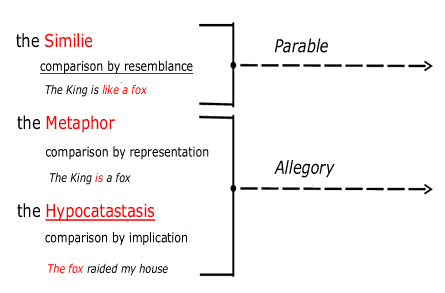
We read from the Prophets, Ezekiel and Jeremiah.
I don’t expect you to have remembered what we found, so let’s take another look in order to gather a mental picture from the Scriptures, and to come to an enlightened understanding of the message God intends to convey through this kind of illustration.
We begin with Ezekiel…
Ezekiel 34:6-31
"My sheep wandered through all the mountains,
and on every high hill; yes, My flock was scattered
over the whole face of the earth,
and no one was seeking or searching for them."
God does not immediately identify who are the sheep, His flock, but it is not at all difficult to form a mental picture from these words.
These sheep were obviously without a shepherd, and no man cared enough to gather them together.
' Therefore, you shepherds,
hear the word of the LORD: "as I live,"
says the Lord GOD,
"surely because My flock became a prey, and My flock became food for every beast of the field,
because there was no shepherd,
nor did My shepherds search for My flock,
but the shepherds fed themselves
and did not feed My flock" -- 'therefore,
O shepherds, hear the word of the LORD!
Notice these words-
you shepherds, My shepherds, and My flock.
Here is an interesting scenario:
God addresses shepherds whom He had apparently
appointed previously, to the task of watching over
and caring for His flock.
But God’s shepherds (My shepherds) apparently acted as hirelings, and when things got tough, they abandoned the sheep-
God specifically addresses those shepherds He had previously appointed, and presents this inference-
Because of these facts…
as there was no shepherd,
surely because My flock became a prey, and My flock became food for every beast of the field, nor did (you) search for My flock, but the shepherds fed themselves, and did not feed My flock.
Therefore this conclusion… O shepherds, hear the word of the LORD!
'Thus says the Lord GOD: "Behold, I am against the shepherds, and I will require My flock at their hand;
I will cause them to cease feeding the sheep,
and the shepherds shall feed themselves no more;
for I will deliver My flock from their mouths,
that they may no longer be food for them."
(Q) What kind of talk is this?
(A) It is idiomatic for, “and I will make search and see what they have done with my sheep.”
' For thus says the Lord GOD: "Indeed I Myself will search for My sheep and seek them out.
Notice the special emphasis in a better translation-
“Truly, I, even I, will go searching and looking for My sheep.”
It should be entirely evident that God Himself plans to enter the earth, in person, and carry out His promise to search and look for His sheep, personally!
"As a shepherd seeks out his flock
on the day he is among his scattered sheep, so will I seek out My sheep and deliver them from
all the places where they were scattered on a cloudy
and dark day.
Could the drama be any more vivid and picturesque?
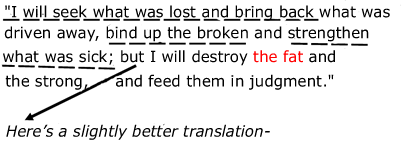
“but the fat and the strong I will give up to destruction; I will give them for their food the punishment which is theirs by right.”
' And as for you,
O My flock, thus says the Lord GOD:"Behold, I shall judge between sheep and sheep,
between rams and goats.
Sometimes sheep among the flock think they have no responsibilities to the LORD for how they treat one another… Now, God explicitly addresses some among His flock in a very direct manner, as to their behavior-
"Is it too little for you to have eaten up the good pasture, that you must tread down with your feet the residue of your pasture – and to have drunk of the clear waters, that you must foul the residue with your feet?
Are you certain that the LORD is not speaking to the shepherds?
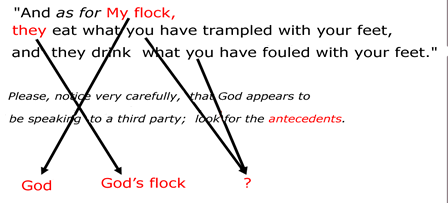
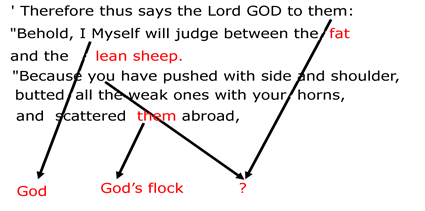
"therefore I will save My flock,
and they shall no longer be a prey;
and I will judge between sheep and sheep.
(Q) To whom is God referring as the antecedent “?” ?
(A) He refers to some among the flock who are not the true sheep of the LORD’s flock.
They are in the flock, but not of the flock.
They make themselves known by their careless behavior toward the other sheep…they push with side and shoulder, and butt all the weak ones with their horns, and scatter them.
And if some are the true sheep of the LORD, but are behaving in the manner of which God is here speaking, they’d best start acting appropriately to their calling!
"I will establish one shepherd over them, and he shall feed them – My servant David. He shall feed them and be their shepherd.
Ezekiel’s words are similar to Jeremiah’s. Both announce a Davidic type shepherd (the Christ), affirming a covenant relationship between the shepherd and the sheep.
"And I, the LORD, will be their God, and My servant David a prince among them; I, the LORD, have spoken.
As opposed to the notion of a ‘king’, stated well after the reign of King David, announcing a ‘prince’ who is to come in the future.
" I will make a covenant of peace with them, and cause wild beasts to cease from the land; and they will dwell safely in the wilderness and sleep in the woods.
"And they shall no longer be a prey for the nations, nor shall beasts of the land devour them; but they shall dwell safely, and no one shall make them afraid.
"Thus they shall know that I, the LORD their God, am with them, and they, the house of Israel, are My people," says the Lord GOD.' ""You are My flock, the flock of My pasture; you are men, and I am your God," says the Lord GOD.
Look how similar are the words of the prophet Jeremiah.
Jeremiah 23:2-6
Therefore thus says the LORD God of Israel against the shepherds who feed My people: "You have scattered My flock, driven them away, and not attended to them. Behold, I will attend to you for the evil of your doings," says the LORD.
"Woe to the shepherds who destroy and scatter the sheep of My pasture!" says the LORD.
In the NKJ
Therefore thus says the LORD God of Israel against the shepherds who feed My people:"You have scattered My flock, driven them away, and not attended to them. Behold, I will attend to you for the evil of your doings," says the LORD.
"But I will gather the remnant of My flock out of all countries where I have driven them, and bring them back to their folds; and they shall be fruitful and increase.
"I will set up shepherds over them who will feed them; and they shall fear no more,
nor be dismayed, nor shall they be lacking,"
says the LORD.
…a new order involving a multiplicity of shepherds.
"But I will gather the remnant of My flock
out of all countries where I have driven them,
and bring them back to their folds;
and they shall be fruitful and increase.
"I will set up shepherds over them who will feed them; and they shall fear no more, nor be dismayed, nor shall they be lacking," says the LORD.
We can generate a picture to illustrate this promise?
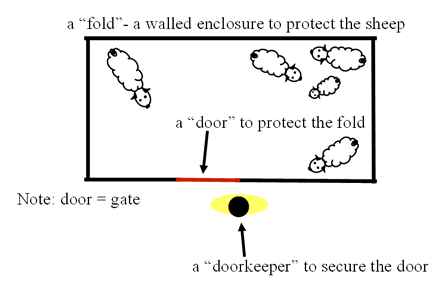
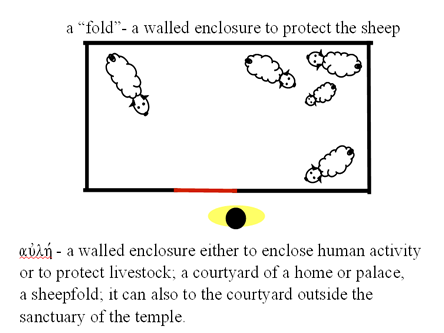
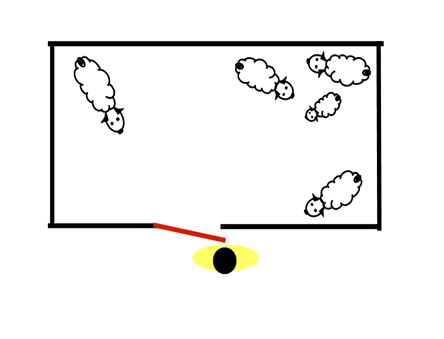
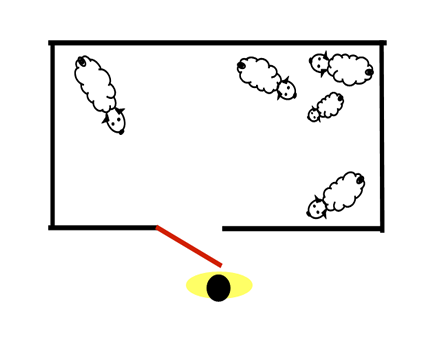
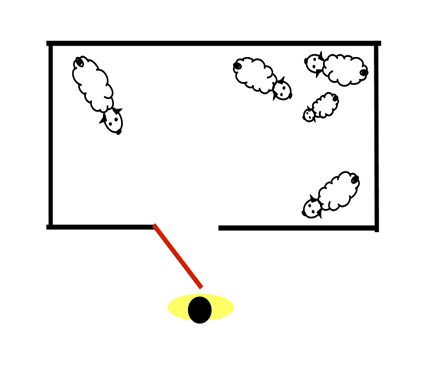
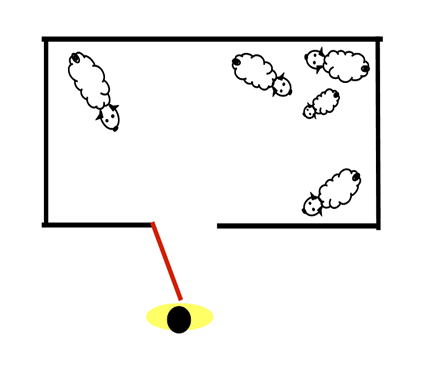
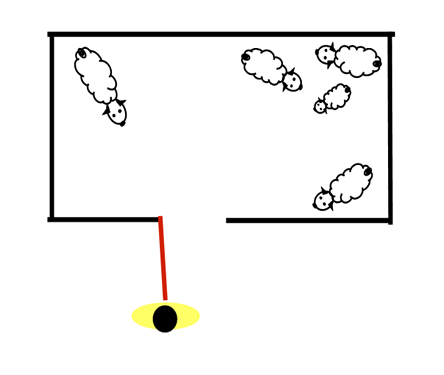
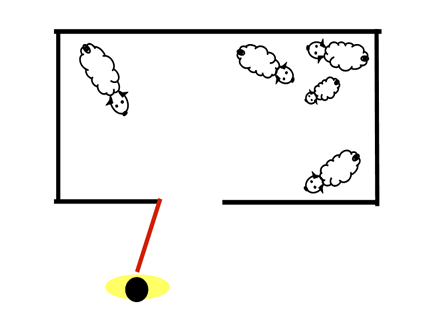
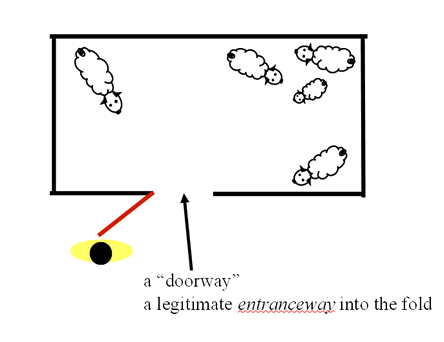
Let’s see how this allegory, the shepherd/sheep figure shows up in the New Testament.
NKJ John 10:1-16
1 "Most assuredly, I say to you,
he who does not enter the sheepfold
by the door[way], but climbs up some other way,
the same is a thief and a robber.
How many individual figures are there? (3)
the sheepfold
the doorway
the thief
Since the identity of these figures are not given, what kind of figure do we have thus far?
![]() simile
simile ![]() metaphor
metaphor ![]() hypocatastasis
hypocatastasis
the sheepfold
The safe dwelling place for God’s people
The place of gathering of God’s people
The kingdom of God
The body of Christ
The true Church
The place of salvation
the doorway
The means of access to salvation
The doorway as a passageway, the entranceway
The emphasis at this point is not on a literal door used as an object closing off an entrance, but upon the doorway as the entranceway itself, which makes legitimate entrance possible.
the doorway
concrete abstract
![]() f door, gate; entrance (of a tomb); opportunity
f door, gate; entrance (of a tomb); opportunity
![]() this morph has two dissimilar meanings,
this morph has two dissimilar meanings,
(1) ‘burn, smoke’ and (2)‘rush’.
We are concerned here with the second meaning, ‘rush’. Somehow it is the major part of the word ![]() meaning ‘door’.
meaning ‘door’.
Apparently the idea of a doorway as an opening into an enclosed space provides an opportunity to “rush through” a wall opening as compared with other ways in; for example, “crawling” through a window opening, etc.
2 "But he who enters by the door[way] is the shepherd of the sheep.
Now there are 5 hypocatastasis figures:
the fold, the sheep, the robbers, the doorway, the shepherd
Jesus is implying that He is Himself ‘the true, legitimate shepherd of the sheep’.
3 "To him the doorkeeper opens [the door], and the sheep hear his voice; and he calls his own sheep by name and leads them out.
the doorkeeper
Good grief! This is getting pretty crowded here!
Now we’ve got 7 hypocatastasis figures!
the fold, the sheep, the robbers, the doorway, the shepherd, the doorkeeper, the door
Notice…
3 "To him the doorkeeper opens [the door], and the sheep hear his voice; and he calls his own sheep by name and leads them out.
the doorkeeper
“the doorkeeper opens [the door] to Him”
This means that the doorkeeper opens the door to/for the shepherd of the sheep, the promised Prince Shepherd who fulfills all the prophesies of the OT.
more…
“the doorkeeper opens to Him”
more…
Who is the doorkeeper?
more…

Only after the doorkeeper has opened the door to make the doorway clear for the true Shepherd to enter, are the sheep which belong to the fold of the Shepherd able to hear His voice and respond appropriately to His call, to come forth, and to follow Him.
more…
Many will be surprised on the Day of Judgment
when they discover
that it was just as the Word of God says;
only the righteousness of Christ is able to save you.All men are sinners and no one can save himself.
God is just, so He must punish sin;
but He is also merciful, moreover gracious,
and offers His Son as the perfect sacrifice
in order to purchase a place for you in heaven,
which He offers to you as the free gift of eternal life.Jesus is the Christ, the Messiah,
the Anointed One, He is God Incarnate.
In order to pay the debt of our sins,
He came from Heaven, having been sent by the Father,
where He lived a life of perfect obedience to the Father
even unto the shameful death upon the cross
in order to pay the debt of your sins.This gift must be received by faith,
believing that Jesus’ perfect life and Cross Work
was His complete and necessary Atonement
for your sins, in your behalf.
Faith is a gift that comes by the Power of God the Holy Spirit working in a person’s innermost being.
Only the power of God can open your heart to the willingness to have the void within it filled
with the presence of Christ by His Spirit.The Holy Spirit has the authority and power to quicken your dead spirit, to make it come to life.
Only the life of His Spirit’s quickening of your heart will allow the Gospel message of salvation to even make sense to you, to truly “hear” the message and give you the ability,
as the Holy Spirit bears witness to Jesus,
to recognize your need for forgiveness and restoration, and gain the desire of your heart to be favorably inclined to want to receive Christ as your personal Lord and Savior.If you have not done so before this moment,
ask Jesus to forgive you your sins,
tell Him you’ve stop trying to be your own savior,
and ask Him to come into your life right now,
and to give you eternal life. Then, in faith believing,
thank Him for the gift that He is giving you,
the one He paid for in full in your place,
in Jesus’ name,
AMEN
Copyright November, 2014
Rev. Jim Craig
All Rights Reserved
Bibliography
Agnes, Michael and Charlton Laird (eds.). Webster’s New World Dictionary and Thesaurus. New York, NY: Macmillan, 1996.
Aland, Kurt, Matthew Black, Carlo M. Martini, Bruce M. Metzger, and Allen Wikgren (eds.). The Greek New Testament, 4th rev. ed. Germany: Biblica-Druck, 1994.
Benner, Jeff A. The Ancient Hebrew Lexicon of the Bible. College Station, Texas: Virtualbookworm.com Publishing Inc., 2005
Bullinger, E. W. Figures of Speech Used in the Bible; Explained an Illustrated. Grand Rapids, Michigan: Baker Book House, 2007.
Chapman, Benjamin. Greek New Testament Insert. Grand Rapids, Michigan: Baker Book House, 1977.
Dana, H. E., and Julius R. Mantey. A Manual of the New Testament. Canada: The Macmillan Company, 1957.
Louw, Johannes P. and Eugene A. Nida. Greek-English Lexicon of the New Testament Based on Semantic Domains. New York, NY: United Bible Societies, 1989.
The ESV Study Bible. Wheaton, Illinois: Crossway, 2011.
Metzger, Bruce M. Lexical Aids for Students of New Testament Greek. Princeton, New Jersey, 1977.
Wikipedia contributors. "Xenophon." Wikipedia, The Free Encyclopedia. Wikipedia, The Free Encyclopedia, 15 Aug. 2014. Web. 19 Aug. 2014.
Wuest, Kenneth S. The New Testament; An Expanded Translation. Grand Rapids, Michigan, 1992.
Wuest, Kenneth S. (Revised, Donald L. Wise). The Practical Use of the Greek New Testament, rev. ed. Chicago, Il: Moody Press, 1982.
Walsh, J. Martyn and Anna Kathleen Walsh. Plain English Handbook: A Complete Guide to Good English, 7th rev. ed. Cincinnati, Ohio: McCormick-Mathers PublishingCompany,1977.